By Lucy Komisar
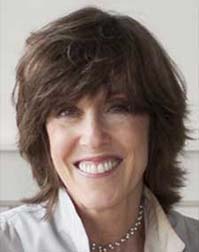
There is a fake character in Nora Ephron‘s “Lucky Guy.” She is a foul-mouthed Newsday reporter, a woman whose cursing outdoes all the men. Such a female reporter didn‘t exist. Quite the reverse: some male reporters at Newsday were so obscenely abusive to the women, that they protested, and the paper‘s editor intervened. How could Ephron get this part of her story so wrong?
I knew Nora Ephron when we both worked at the New York Post in the mid-1960s. She must have been taking notes. The paper was dominated in spirit if not numbers by a bunch of hard-drinking, rough-talking Irishmen, and what was on “the wood,” the big headline above the masthead, was eagerly noted as reporters grabbed for the freshly inked papers stacked on gray steel city room desks half a dozen times a day.
Ephron herself was a feature writer, not a hard-news hound, but she was caught up in the spell of the news. (So was I.) The comment by Mike McAlary (Tom Hanks), the hero of “Lucky Guy,” “All I ever wanted to be was a reporter,” speaks for her. But part of the story she tells in the play bothered me and raised questions about her journalism credentials.
Ephron didn‘t know McAlary, who was a reporter years after she was at The Post, but his Pulitzer Prize-winning exposé of the police attack on Haitian New Yorker Abner Louima made him a star. Ephron also knew a “good story” when she chose to write about him. She recaptured the time by interviewing reporters of the era.
Hanks, in a tan suit, exudes energy and ambition. His McAlary is self-involved to the point of parody. No idealistic muckraking journalist he, McAlary dreams of getting a big house and Subzero fridge.
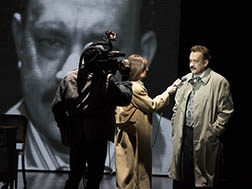
As Ephron tells it, McAlary has “Breslinitis.” He wants to become a famous Jimmy Breslin-style columnist who breaks big stories. She doesn‘t draw him as a superhero. She depicts him building his career by sucking up to bosses and even to Donald Trump as well as by getting sources, especially cops, to talk.
The time is the tabloid wars that started in the late 1980s when hot shots were in a celebrity-writer price war that engaged The Post, The News and Newsday. McAlary worked at all three. Ephron takes him through a rise that began with Newsday. Ironically, McAlary gets his shot when Breslin quits The News for Newsday. One of McAlary‘s colleagues remarks that he is “a two-bit hack who got Breslin‘s slot but not his talent.”
His big story comes from a tip, as most big stories do. We see him in 1997 at Coney Island Hospital interviewing Louima, who had been sodomized with a plunger by cop Justin Volpe. The story made “the wood” for days. (Louima would undergo three operations to repair the internal damage. Volpe got 30 years in federal prison.) McAlary, ill when he pursued the case, would die of cancer in 1998.
The play is realistic, sometimes hokey, occasionally inaccurate, often riveting and always entertaining. But it starts out wrong-footed.
Ephron depicts New York Newsday reporter Louise Imerman (Deirdre Lovejoy) as uttering “fuck” every other word. Though all the other names in the play are real, neither Newsday reporters of that time whom I contacted nor a NexisLexis search turned up anyone with that name. Linda Winer, the theater critic for Newsday, in her review wrote about “a lone woman reporter” without mentioning a name. She told me in an email, “I know people in my office asked the same question and came up with no answer. She may be a composite.”
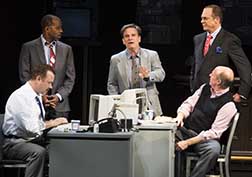
The other characters in the play are real people. Louise Imerman is not. Answering my query, the play‘s publicist, Christine Olver of Boneau/Bryan-Brown, acknowledged that Imerman was a composite.
It matters because male reporters depicted, including Hap Hairston (Courtney B. Vance), McAlary‘s editor at Newsday and then at The Daily News, get a pass in the abusive words department. Sure, the male reporters said “fuck” a lot. The play has some 70 “fucks,” only seven attributed to Imerman, but it dominates her character‘s dialogue.
So let‘s go back to the script. Unlike the men, she is cited by her first name.
HAP HAIRSTON Just let me set the fucking thing up. Louise.
MCALARY Why do you need Louise?
HAP HAIRSTON In my story, Louise is a character.
Louise Imerman enters, but just barely.
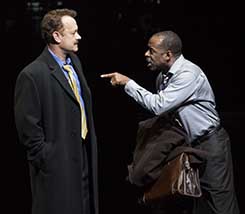
LOUISE McAlary‘s right. You don‘t really need me. (to audience) This is a story about guys, guys with cops, cops with guys. It‘s a very guy thing. (to Hap and the ensemble) The reason they were all hung up on McAlary is he made them think they could go back to the days when there were no women around, none, just Irish guys at the bar all night long. You don‘t need me at all.
HAP HAIRSTON (prompting her) So —
LOUISE (with feeling) — Kiss my ass.
HAP HAIRSTON And —
LOUISE (with feeling) — Fuck you.
HAP HAIRSTON That‘s it. (to audience) That‘s Louise.
There‘s a lot more of that. Hap wants her to go on a story.
LOUISE Fuck you, kiss my fucking ass, I have plans. It‘s Friday. Did you ever fucking hear of Friday?
Later, McAlary says: Louise, you are looking stunning.
LOUISE Fuck you.
And later
HAP HAIRSTON (to audience) — and I call Louise over to give it to her. Because she had seniority. The night before she‘d taken the Deputy Police Commissioner to dinner and managed to get the list of cops who were being indicted and faxed it from the restaurant.
Louise Imerman comes over to the desk and looks at Hap.
LOUISE Yeah, what is it?
HAP HAIRSTON (to Louise) I‘ve got one of the cops. He‘s in the D.A.‘s office in Brooklyn. (to audience) So by now you know what Louise is going to say.
LOUISE (to Hap) Fuck you, kiss my ass, I‘m not doing another fucking thing on this story. I was up all night getting that list, I‘m not going home late again, because I had to spend the day holding some cop‘s dick. (to audience) And by the way, that is the end of me in this story.
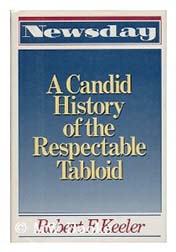 Sure, that‘s the end of it. She fulfilled her function of defining a woman reporter. Of course a play is a made-up thing. But what does “composite” mean in this play that portends to be telling a true story? That there were a few women who occasionally said “fuck” and they were “composited” to increase the use of the word? Or that there were “a number” of women who said “fuck” as frequently as Louise? Or did McAlary‘s remark of “no women around” mean a woman had to make her presence felt by speaking dirtier than they did?
Sure, that‘s the end of it. She fulfilled her function of defining a woman reporter. Of course a play is a made-up thing. But what does “composite” mean in this play that portends to be telling a true story? That there were a few women who occasionally said “fuck” and they were “composited” to increase the use of the word? Or that there were “a number” of women who said “fuck” as frequently as Louise? Or did McAlary‘s remark of “no women around” mean a woman had to make her presence felt by speaking dirtier than they did?
Ephron does not dramatize the fact that, according Robert Keeler, a Newsday journalist for more than 40 years and author of “Newsday: A Candid History of the Respectable Tabloid” (William Morrow, 1990), the New York Newsday newsroom was so “foul-mouthed,” with men liberally sprinkling their language with “c-u-n-t,” that women reporters protested. He spelled out the c-word to me, adding that it was removed from his book at the “suggestion” of Newsday‘s publisher, Robert Johnson.
Keeler (a Pulitzer Prize winner and later member of the Newsday editorial board) wrote that the women complained “that the newsroom in New York had taken on the demeanor of a men‘s locker room. Too many crude and offensive epithets flung at women, too many sexual jokes and anti-gay put downs.” McAlary was at the paper at the time.
I asked Amanda Harris, who was business and state editor then, if there were any women who spoke like “Louise.” She said, “No, literally there weren‘t.”
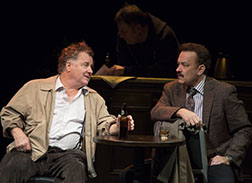
But she recalled the language of some of the editors. She said, “There was what we used to call a locker room atmosphere, a very unpleasant atmosphere about women. The language that Cotter and Hairston used was the most dramatic thing that was going on. The male editor would stand up at the city desk and point across the room to a reporter and say, ˜Hey cunt, come here. I heard Cotter do it.”
One day a group of editors at New York Newsday, including John Cotter (Peter Gerety in the play), were talking about a forthcoming meeting at which the women were going to discuss their complaints with the paper‘s editor-in-chief, Tony Marro.
Keeler wrote, “Hap came in and said, ˜I‘ve been warning you guys for a year about this.‘ He kept going on saying ˜I was innocent. I didn‘t do anything. I warned you guys.‘ ” Keeler wrote, “The other editors in the room laughed, because they felt that Hairston was as foul-mouthed as any of them.”
Harris said that after the meeting, “Cotter stopped calling women cunts. Hap went to The News. It changed.”
I‘m bothered that a journalism aficionada like Ephron would create a foul-mouthed female “composite” without setting her against the infinitely worse foul-mouthed men she worked with. After all, “fuck” is just an expletive; the men were crudely attacking women. It seemed unlike Ephron, who was a strong women; I don’t know if she was a feminist.
I asked play publicist Olver, “Can you tell me whether the dialogue of the character Louise Imerman was added or altered after Nora Ephron’s death?” I also asked to speak to someone connected with the play, preferably the director, George C. Wolfe, about this character. Ms. Olver wrote back, “An interview is not available, and the character was written by Nora.”
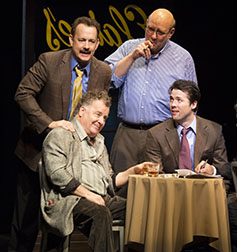
The reporters Ephron and I knew at The Post weren‘t as rough-talking as the tabloid guys in the period 25 years later whom she presented in “Lucky Guy,” though some of them routinely repaired to the Page One bar on Rector Street after work and a few of the lobster shift rewritemen went there for morning Martinis. Ephron‘s characters, like them, are almost Damon Runyonesque. (The name on this bar’s window is Ephron’s early-days hangout, Elaine’s.)
The invented Louise Imerman aside, it‘s a very good play. The cast is uniformly excellent, including Vance as the sharp-voiced, cynical Hairston (minus sexist slurs), Peter Scolari as the solid Newsday editor and writer Michael Daly, Christopher McDonald as McAlary‘s pinstriped, fast-talking lawyer-manager Eddie Hayes, Gerety as the often soused Cotter, and Maura Tierney as McAlary‘s long suffering wife, Alice. It‘s a theatrically exciting love letter to journalism.
I just wish all the reporting in the play had been as good.
“Lucky Guy.” Written by Nora Ephron; directed by George C. Wolfe. Broadhurst Theatre, 235 West 44th St., New York City. 212-239-6200. Opened April 1, 2013; closes July 3, 2013. 4/25/13. Review on New York Theatre Wire.


Well done Lucy, because you’ve done it! You’ve brought together your investigative side and your love of theatre side!
Plays as fiction can wander anywhere, but plays hi-lighting historical fact are under a moral obligation to not alter the truth to the point of distortion and misrepresentation, and this one by all accounts has. You’ve been there and done that. I say shame on them, and shame on the director and publicity department for dodging your direct questions about authorship. They should be answered. Perhaps Tom Hanks won’t dodge the bullet, try asking him.
This particular review may not belong in a family newspaper, but it’s what we need to hear, and has a direct bearing about the persistent influence of Broadway blather on adult playgoers.
Quite a slam-bang original take, Lucy. Why did Nora create a totally unbelievable female newsroom figure–fyi, called “newshens” in those day–who out-curses the men? Could be someone close to the creative effort wanted some counterpoint and “more balance”. Could be that person was Nora herself, after listening to Tom Hanks who told her early on that McAlary, as written, was too unsympathetic for him to play. Could be that Nora herself, so close to her death, wished wildly to imagine a tough broad in the mix?
You were dead wrong to call the play “realistic” just because it’s based loosely on some real tabloid reporters. There is noting realistic about breaking through the fourth wall with newsroom reporters speaking directly to the audience. Tennessee Williams is never called a “realistic playwright” although his plays draw directly from his experience.. Any play, per se, springs from the fertile mind of an unreliable narrator, although people often falsely read “true” in what they see. Nora’s concept was not to do a stage documentary . It was to get her final creative work on the boards.
Lucy — We worked together at the New York Post and I remember you well. My friend Harry Haun at Playbill sent me your piece on “Lucky Guy” with the photo of a fat bald character called “Jerry Nachman” — clearly the other Jerry Nachman, the late NY Post columnist and editor, though she knew me so maybe it’s a composite character as well. I’ve followed your career in the women’s movement and am glad to see you’re still slugging away online. I did a piece on my NY Post years that ran in the American Scholar last year that I’d like to send you if you send me your email address.
Susan goes to the meat of what must have been Nora’s dilemma. What we’re offered on stage in this piece is a depiction of a time, and it lies.
I too lived in Manhattan through that era, from 1959-1967. I was in MacBird on Bleecker Street. The only 4 letter words out of the mouths of women in those days were confined to a privileged few, such as Maureen Stapleton and Coral Browne who flung them around to great humorous effect, when those words had real power.
The zeitgeist of the day was that women had yet to find their feminist side, led by very few such as you, Lucy, a rare loner. Men ruled. To see an era and real people’s reputations manipulated for a star who doesn’t trust his image to stray too far from his Hollywood image is a betrayal of trust, as far as I ‘m concerned. Tennessee Williams or Arthur Miller would never have allowed such tampering with truth for the purposes of theatrical conflict and effect. Nor would A.R. Gurney, the fourth wall king.
Tom Hanks is an excellent actor. But not a Dustin, nor a Pacino, nor a De Niro.
Perhaps Nora’s notes will be available one of these days. She must have bent to the will of others. We will never hear more about this from the producers.
Pingback: 诺拉·艾芙伦的《幸è¿å„¿ã€‹ | Teachinghand.com